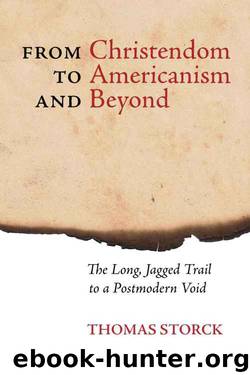From Christendom to Americanism and Beyond: The Long, Jagged Trail to a Postmodern Void by Thomas Storck

Author:Thomas Storck [Storck, Thomas]
Language: eng
Format: epub
ISBN: 9781621381440
Amazon: 1621381447
Publisher: Angelico Press
Published: 2015-08-06T22:00:00+00:00
The postwar rejection of Bellocianism by the English Catholic intellectuals was thus part of a much more significant development. The reconciliation of English Catholic intellectuals with modern English society had been a step in the direction of the Church’s subsequent advocation, in Gaudium et Spes . . . of active engagement in contemporary society, of dialogue with modernity rather than reflexive opposition to it. (383)
There is certainly truth here, but I must reiterate that it is false to refer to Belloc and his contemporaries and followers as proponents of a “‘fortress’ Catholicism,” opposed to “active engagement in contemporary society.” They engaged the world outside the Church at least as much as Catholics do now. Nor is it true that Catholics were having no effect on the world around them. Aside from the large numbers of converts, Prof. Lothian recounts the interesting incident that in 1932 the Manchester Guardian had taken note of the publishing house of Sheed & Ward and its role in “bringing the fruits of the intellectual renaissance among Catholics in Europe to the English public” (242). The main difference is that then there was agreement among Catholics on the purpose of such engagement with their contemporaries. Today there is little agreement on what is the purpose of engagement and dialog, whether conversion, mutual understanding and collaboration, or even an effort toward syncretism. “Bellocianism” had its defects, to be sure, especially as it was carried on by those who considered themselves Belloc’s disciples, such as Woodruff, Jerrold, and Hollis, but who often took more extreme positions than did Belloc himself. Nevertheless, it was an intellectual view built around Catholic teaching and tradition and that sought to apply that teaching and tradition to the world, even if its judgments were sometimes skewed.
Thus, Prof. Lothian in his Epilogue raises the always pertinent question of what stance the Church should take toward the contemporary world outside her boundaries. He clearly thinks that what he calls “Bellocianism” was a mistake, but we shall judge Belloc, Chesterton, and the rest largely by what we think the Church is and what her bearing should be toward the world. Chesterton says somewhere that the Church is larger than the world. If we believe that—if we believe that the Church’s classical understanding of her mission was largely correct—we shall favor engagement, but engagement that seeks in some fashion to apply what Christ mandated when he told his apostles to go out into the world and preach the Gospel to every creature. On the other hand, if we see the Church as a valuable institution no doubt, one among many probably equally valuable institutions, and not only with no monopoly on the truth but in fact with at least as much to learn from those outside her as to teach them, we shall want a very different kind of engagement and a dialog whose purpose is far from clear, except that it is definitely not the conversion of our interlocutors. Prof. Lothian’s book is valuable in that
Download
This site does not store any files on its server. We only index and link to content provided by other sites. Please contact the content providers to delete copyright contents if any and email us, we'll remove relevant links or contents immediately.
The 5 Love Languages: The Secret to Love That Lasts by Gary Chapman(9790)
The Space Between by Michelle L. Teichman(6929)
Assassin’s Fate by Robin Hobb(6199)
Wiseguy by Nicholas Pileggi(5770)
Everything Happens for a Reason by Kate Bowler(4734)
Gerald's Game by Stephen King(4641)
Pillow Thoughts by Courtney Peppernell(4271)
A Simplified Life by Emily Ley(4158)
The Power of Positive Thinking by Norman Vincent Peale(4062)
Harry Potter and the Prisoner of Azkaban (Book 3) by J. K. Rowling(3350)
Resisting Happiness by Matthew Kelly(3337)
Girl, Wash Your Face by Rachel Hollis(3282)
Being Aware of Being Aware by Rupert Spira(3272)
The Secret Power of Speaking God's Word by Joyce Meyer(3180)
The Code Book by Simon Singh(3178)
More Language of Letting Go: 366 New Daily Meditations by Melody Beattie(3023)
Real Sex by Lauren F. Winner(3014)
Name Book, The: Over 10,000 Names--Their Meanings, Origins, and Spiritual Significance by Astoria Dorothy(2979)
The Holy Spirit by Billy Graham(2944)
